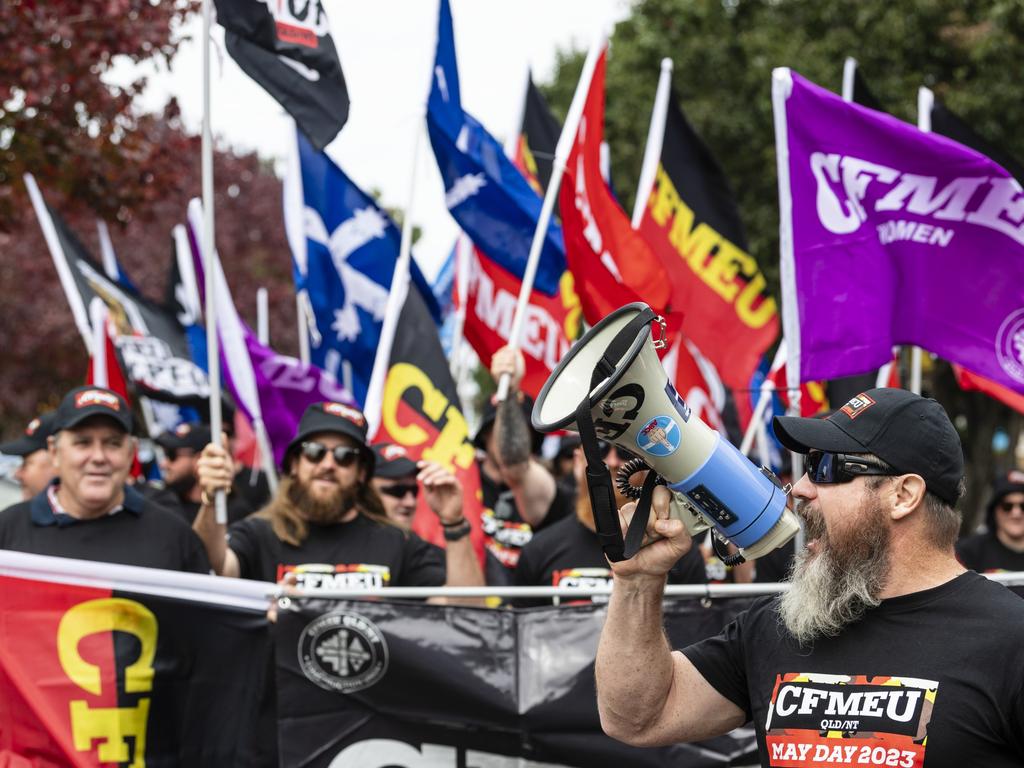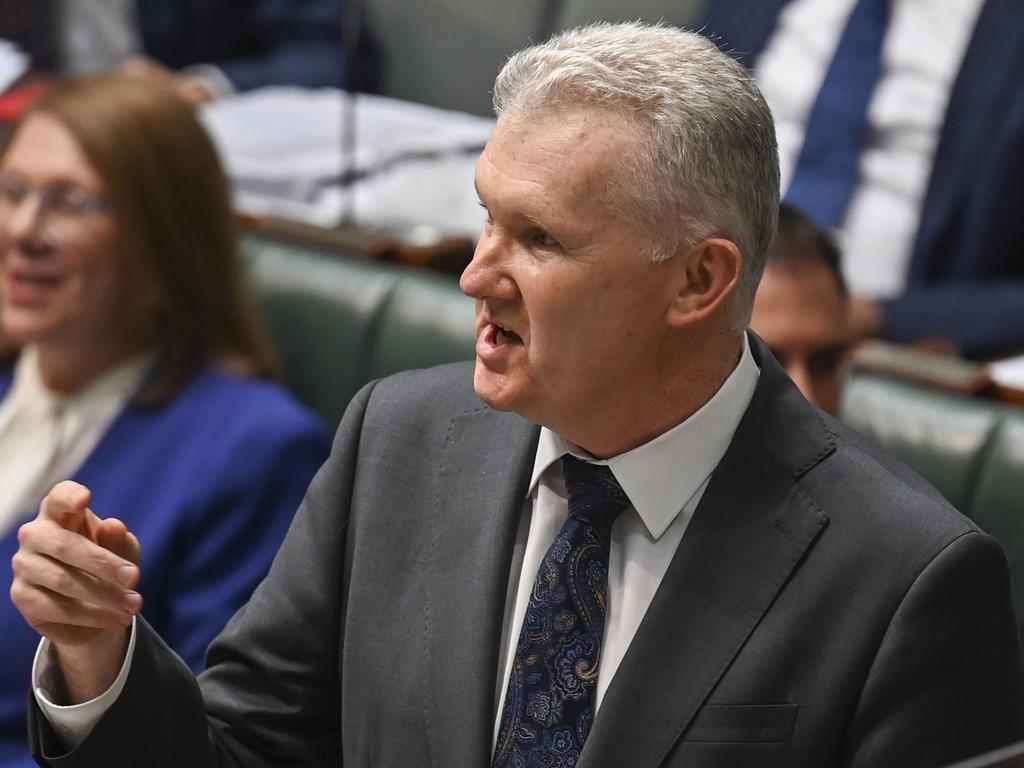Labor poised to cut deal on ‘same job, same pay’ laws
A test to prevent specialist mining and energy contractors being caught up in the Albanese government’s ‘same job, same pay’ laws is being examined.

A new test to prevent specialist mining and energy contractors being inadvertently caught up in the Albanese government’s “same job, same pay” laws is being examined by Employment and Workplace Relations Minister Tony Burke following significant negotiations with resource sector employers.
In what shapes as a major breakthrough that could ease hostilities with business over Labor’s second wave of industrial relations changes, Mr Burke revealed he was considering introducing a new test after meeting a delegation of contractors led by the Australian Resources and Energy Employer Association.
Mr Burke, in an exclusive interview with The Australian, also revealed the government was open to phasing in the contentious legislation, emphasising any delay would be months rather than years to stop employers trying to circumvent the new laws.
Under the employer proposal, the Fair Work Commission would be guided by a so-called “multi-factor” test for defining what arrangements should, and should not, be considered labour hire for the purpose of same job, same pay entitlements and obligations.
Asked whether he was open to the new “multi-factor” test, Mr Burke said: “It’s one of the things we are considering in the consultation”.
But he is pushing back against calls by the Business Council of Australia to confine the proposed laws to the base rate of pay, rather than the full rate of pay, warning the BCA position risked entrenching the loophole that the government was seeking to close.
Employers are concerned the government’s consultation paper on the same job, same pay changes opens the way for an expansion of the policy from targeting traditional labour hire to contracting arrangements that provide specialist maintenance, production, facilities management and related support services to the mining and oil and gas sectors.
In a letter to Mr Burke, AREEA deputy chief executive Tara Diamond said the business lobby group “accepts your government’s firm plans to legislate the same job, same pay policy”, and the primary interest of its members was to ensure the laws captured circumstances where labour hire was used to undercut an enterprise agreement between a host business and their direct workforce.
She said without the multi-factor test, a range of specialist contracting services might be wrongly defined as labour hire and burdened by administrative complexities, red tape and increased costs. The test would be applied by the Fair Work Commission when considering applications.
“It is not an exaggeration to forecast that such an outcome could be devastating for contracting businesses similar to those represented in last week’s AREEA delegation – employers providing highly paid work, training and upskilling opportunities for many thousands of Australians,” she said.

Mr Burke said the meeting with AREEA and its members had been a “very constructive conversation and I have got the department working through some options on the basis of that conversation”. He said the more constructive dialogue with AREEA had been a “significant and welcome shift”, given the lobby group last year threatened a multi-million-dollar campaign against Labor’s first wave of workplace changes.
Mr Burke stressed the proposed narrow application of the same job, same pay policy.
“The problem that we are trying to solve is where an enterprise agreement has been put in place where there are agreed rates of pay and then an employer uses a labour hire firm in order to undercut those rates of pay,” he said.
He said he had been “crystal clear with stakeholders that there are legitimate purposes for labour hire that we don’t want to get in the way of, and they include for specialist workforce, for surge workforce and for temporary replacement”.
He said the policy would impact a limited number of workplaces covered by an enterprise agreement that paid significantly over the award but used labour hire workers paid below the agreement rates. “When you go through where this loophole is, it’s a subset of a subset of a subset,” he said.
Mr Burke hit back at employer claims that the laws would hurt productivity. “Every business has already agreed as to what the productivity value of the job is,” he said. “That’s what they put in their agreement. The government’s position is you shouldn’t then go below that and be paying people less than what you have already decided is the value of their productivity.
“There can only be a problem with productivity in this policy if businesses believe in their enterprise agreement they are putting a value there that is not correct. What’s actually happening here is that a set of workers who fall under this loophole are being paid less than what the employer has already agreed is the productivity value of the workforce.”
The multi-employer bargaining laws had a delayed introduction and Mr Burke said he was open to a conversation about also phasing in the same job, same pay laws. “All legislation needs sensible implementation times but I’m very wary of long periods here because if someone’s a bad actor they will use that time just getting legal advice and organising,” he said.
““The way I think about it is this: your delay in implementation is for the purpose of giving people a chance to be able to implement it because people need some time to be able to implement, but that’s the only reason for delay, you don’t delay for the purposes of avoiding being able to close the loophole.
ACTU secretary Sally McManus said on Sunday it was “reasonable there be a phase in, but workers should not have to suffer this injustice a day longer than they need to. Business has been on notice for years of Labor’s intention to stop these schemes.”
Ms McManus said same job, same pay was a simple concept. “If you perform work for an employer, whether you’re employed directly by that employer or not, you should be paid the same as you would have if you were employed directly by them,” she said.
“For too long big business has been gaming the system and using labour hire to do so. This is a wage-cutting loophole and it has to end.”
Union leaders have attacked Reserve Bank governor Philip Lowe after he said there would be concern if the 5.75 per cent pay rise granted to low-paid workers by the Fair Work Commission became a “benchmark” for private sector enterprise agreements.
Mr Burke said he respected the views of Dr Lowe and the independence of the Reserve Bank but it was important “everyone’s aware that we don’t have centralised wage-fixing anymore and we have in Australia now a level of union membership that’s relatively low”. On the government’s desired level of wage increases, he said “we are wanting to see the lines cross” where inflation comes down and wages get in front of inflation again, delivering real pay rises.








To join the conversation, please log in. Don't have an account? Register
Join the conversation, you are commenting as Logout